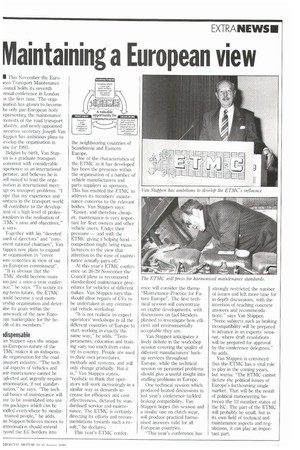Maintaining a European view
Page 23

If you've noticed an error in this article please click here to report it so we can fix it.
I This November the Eurolean Transport Maintenance ;mind holds its seventh rumal conference in London or the first time. The orgatisation has grown to become he only pan-European body epresenting the maintenance lterests of the road transport idustry, and newly-appointed xecutive secretary Joseph Van ltappen has ambitious plans to evelop the organisation in ime for 1992.
Belgian by birth, Van Stapen is a graduate transport conomist with considerable xperience as an international perator, and believes he is ;ell suited to lead the orgaisation in international meetigs on transport problems. "I ope that my experience and ontacts in the transport world rill contribute to the developlent of a high level of profesionalism in the realisation of ;TMC's aims and objectives," e says.
Together with his "devoted oard of directors" and "cornetent national chairmen", Van tappen now plans to expand le organisation to "cover lore countries in view of our an-European commitment".
"It is obvious that the
TIV,IC should become more ian just a once-a-year confernee," he says. ''To secure its )ng-term future, the ETMC lould become a real memen-ship organisation and detertine its goals within the 'amework of the new Euroaan marketplace for the be
fit of its members."
an Stappen says the unique In-European nature of the TMC makes it an indispens)Ie organisation for the road ansport industry. "The techcal aspects of vehicles and teir maintenance cannot be ..±glected and urgently require irmonisation, if not standarsation," he says. "The techcal basics of maintenance will ive to be assimilated into unirm packages which can be indled everywhere by similartrained people," he adds. an Stappen believes moves to irmonisation should extend yond the EC borders into
the neighbouring countries of Scandinavia and Eastern Europe.
One of the characteristics of the E'I'MC as it has developed has been the presence within the organisation of a number of vehicle manufacturers and parts suppliers as sponsors. This has enabled the ETMC to address its members' maintenance concerns to the relevant bodies. Van Stappen says: "Easier, and therefore cheaper, maintenance is very important for fleet owners and other vehicle users. Under their pressure — and with the ETMC giving a helping hand — competition might bring manufacturers to the view that attention to the ease of maintenance actually pays off."
At this year's ETMC conference on 26-29 November the Council plans to recommend standardised maintenance procedures for vehicles of different makes. Van Stappen says this should allow repairs of CVs to be undertaken in any commercial vehicle workshop.
"It is not realistic to expect operators' workshops in all the different countries of Europe to start working in exactly the same way," he adds. "Temperaments, education and training vary too much from country to country. People are used to their own procedures, methods and systems, and will only change gradually. But it is," Van Stappen states, "realistic to think that operators will work increasingly in a similar way as demands increase for efficiency and costeffectiveness, dictated by standardised service and maintenance. The ETMC is certainly directing its efforts and recommendations towards such a result," he declares.
This year's ETMC confer ence will consider the theme "Maintenance Practice for Future Europe". The first technical session will concentrate on engine developments, with discussions on fuel blenders planned to investigate how efficient and environmentally acceptable they are.
Van Stappen anticipates a lively debate in the workshop session covering the quality of different manufacturers backup services throughout Europe, while the technical session on personnel problems should give a useful insight into staffing problems in Europe.
One technical session which produced heated discussions in last year's conference tackled braking compatibility. Van Stappen hopes this session and a similar one on clutch wear, will produce practical harmonised answers valid for all European countries.
'''I'his year's conference has strongly restricted the number of issues and left more time for in-depth discussions, with the intention of reaching concrete answers and recommendations," says Van Stappen. "Some subjects such as braking incompatibility will be prepared in advance in an experts' seminar, where draft resolutions will be prepared for approval by the conference delegates," he adds.
Van Stappen is convinced that the ETMC has a vital role to play in the coming years, but warns: "The ETMC cannot dictate the political issues of Europe's forthcoming single market. That will be the result of political manoeuvring between the 12 member states of the EC. The part of the ETMC will probably be small, but in its own field of technical and maintenance aspects and regulations, it can play an important part.




































































































